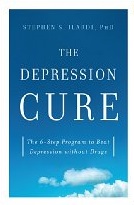
In his book, “The Depression Cure: The 6-Step Program to Beat Depression without Drugs,” author Stephen Ilardi argues that the rate of depression among Americans is roughly ten times higher today than it was just two generations ago, and he points the blame to our modern life-style. Everything is so much easier today than it was back when we had to hunt and gather. Why doesn’t the convenience translate into happiness?
His book concentrates on six ways we’ve turned our back on the things that fight depression. I concur with him that the modern lifestyles contributes to the rise of depression, and I wholeheartedly support all six steps he offers. In fact, each one is included in my 12-step program for beating depression. However, I am uncomfortable with his dismissal of medication, because that is such an important part of my program. He agrees that for those battling severe depression, antidepressants are effective, and claims that individuals suffering from bipolar disorder derive unequivocal benefit from mood stabilizers. But he thinks that the majority of those suffering from unipolar depression can get better on their own.
I guess I’m a tad skeptical because I tried that route. Even though I had implemented all six of his steps into my recovery program, I didn’t get well until I found the right medication combination–which included two antidepressants in addition to a mood stabilizer–to treat my bipolar disorder; that is, until I was stable enough to continue all the exercises needed to get and stay well. And the mood stabilizer by itself was not enough to bring me out of a suicidal depression.
I want to highlight his six steps, however, because I do think they are crucial to a recovery program from depression, and I congratulate him on such a comprehensive book.
1. Omega-3 Fatty Acids
Yes. Absolutely. I get a Noah’s Ark shipment of those to my house every month, as I have read the same research. Ilardi writes:
Because the brain needs a steady supply of omega-3s to function properly, people who don’t eat enough of these fats are at increased risk for many forms of mental illness, including depression. Across the globe, countries with the highest level of omega-3 consumption typically have the lowest rates of depression.
Clinical researchers have even started using omega-3 supplements to treat depression, and the results so far have been highly encouraging. For example, British researchers recently studied a group of depressed patients who had failed to recover after taking antidepressant medication for eight weeks. All study patients stayed on their meds as prescribed, but some also took an omega-3 supplement. About 70 percent of those who received the supplement went on to recover, compared with only 25 percent of patients who kept taking only the medication. This study–along with a handful of others like it–suggests that omega-3s may be among the most effective antidepressant substances ever discovered.
2. Engaged Activity
According to Ilardi, engaged activity keeps us from ruminating, and ruminating causes depression. I understand his logic, and he is right that we are more isolated now in our lifestyle than even 10 years ago because technology allows us to do our jobs individually. Says Ilardi:
The biggest risk factor for rumination is simply spending time alone, something Americans now do all the time. When you’re interacting with another person, your mind just doesn’t have a chance to dwell on repetitive negative thoughts. But, really, any sort of engaged activity can work to interrupt rumination. It can even be something simple.
3. Physical Exercise
You all know where I stand on exercise: it’s essential. At least for this brain. I can’t go two or three days without feeling the effect of no exercise. I’ve cited much of the same research as Ilardi in past posts. But here’s a reminder. Ilardi writes:
Researchers have compared aerobic exercise and Zoloft head to head in the treatment of depression. Even at a low “dose” of exercise–thirty minutes of brisk walking three times a week–patients who worked out did just as well as those who took the medication. Strikingly, though, the patients on Zoloft were about three times more likely than exercisers to become depressed again over a ten-month follow-up period.
There are now over a hundred published studies documenting the antidepressant effects of exercise. Activities as varied as walking, biking, jogging, and weight lifting have all been found to be effective. It’s also becoming clear just how they work. Exercise changes the brain. It increases the activity level of important brain chemicals such as dopamine and serotonin (the same neurochemical targeted by popular drugs like Zoloft, Prozac, and Lexapro). Exercise also increases the brain’s production of a key growth hormone called BDNF. Because levels of this hormone plummet in depression, some parts of the brain start to shrink over time, and learning and memory are impaired. But exercise reverses this trend, protecting the brain in a way nothing else can.
4. Sunlight Exposure
Says Ilardi:
A deeper link exists between light exposure and depression–one involving the body’s internal clock. The brain gauges the amount of light you get each day, and it uses that information to reset your body clock. Without light exposure, the body clock eventually gets out of sync, and when that happens, it throws off important circadian rhythms that regulate energy, sleep, appetite, and hormone levels. The disruption of these important biological rhythms can, in turn, trigger clinical depression.
Because natural sunlight is so much brighter than indoor lighting–over a hundred times brighter, on average–a half hour of sunlight is enough to reset your body clock. Even the natural light of a gray, cloudy day is several times brighter than the inside of most people’s houses, and a few hours of exposure provide just enough light to keep circadian rhythms well regulated.
5. Social Support
I can’t count the number of studies I’ve read indicating the importance of social support. Recently Rick Nauert posted the results of a recent University of Michigan study on how gossip does us good. University of Michigan researcher and lead author of the study, Stephanie Brown, said: “Many of the hormones involved in bonding and helping behavior lead to reductions in stress and anxiety in both humans and other animals. Now we see that higher levels of progesterone may be part of the underlying physiological basis for these effects.”
Ilardi writes:
The research on this issue is clear: When it comes to depression, relationships matter. People who lack a supportive social network face an increased risk of becoming depressed, and of remaining depressed once an episode strikes. Fortunately, we can do a great deal to improve the quality and depth of our connections with other and this can have a huge payoff in terms of fighting depression and reducing the risk of recurrence.
6. Sleep
Again, amen! Per Ilardi:
When sleep deprivation continues for days or weeks at a time, it can interfere with our ability to think clearly. It can even bring about serious health consequences. Disrupted sleep is one of the most potent triggers of depression, and there’s evidence that most episodes of mood disorder are preceded by at least several weeks of subpar slumber.
To read more Beyond Blue, go to http://blog.beliefnet.com/beyondblue, and to get to Group Beyond Blue, a support group at Beliefnet Community, click here.
To subscribe to “Beyond Blue” click here.
![]()

